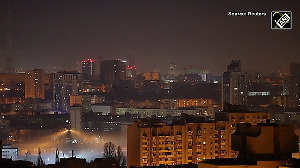India has a very poor record when it comes to governments protecting the privacy of its citizens, according to the latest report from Privacy International, a watchdog on surveillance and privacy invasions by governments and corporations.
India scored 1.9 points, which makes it an "extensive surveillance society". The US scored 1.5 points while the UK managed 1.3. Both countries are labelled "Endemic surveillance societies".
A score between 4.1 and 5.0 (the highest score) would mean a country "consistently upholds human rights standards".
While experts more or less agree with India scoring a low 1 point for "privacy enforcement", its overall ranking as a high surveillance society appears illogical.
The PI report's key benchmark for privacy safeguards (or lack of them) appears to be technological sophistication. Indeed, its report states that technological advances, interoperability between information systems and the globalisation of information have placed extraordinary pressure on the few remaining privacy safeguards.
"The effect of these developments has been to create surveillance societies that nurture hostile environments for privacy," the report stated.
Thus, the PI report points out, concern over immigration and border control dominated countries like the US and the UK in 2007 prompted them to swiftly implement database, identity and fingerprinting systems, "often without regard to the privacy implications for their own citizens".
Can India be bracketed with these technologically advanced countries?
"I don't agree," said Internet expert and President of the Foundation for Information Security and Technology (FIST) Vijay Mukhi.
The key reason, he said, is that India's spending on technology for surveillance is poor.
While the hardware is cheap, the surveillance software is prohibitively expensive and India simply does not have the budget for such equipment.
The US police departments, for instance, hire mathematicians and PhDs to decode messages and develop surveillance software. This is not the case in India.
PI, nevertheless, reasons that India has no explicit right to privacy, though the Supreme Court sees it as implicit under Article 21 on the right to liberty.
It stated that fraud and identity theft in the outsourcing industry continue; the country has a history of abuse of wiretapping and NGOs' complain of their communications being intercepted; law requires disclosure of encryption keys, and there are stiff penalties on anyone who fails to provide requested information to authorities.
"Personal data are not being guarded in India," agreed Chirag Unadkat, chairperson, DAML, NMIMS University.
"While companies in advanced countries spend, on an average, 2 per cent of their revenues on data security, Indian companies spend just around 0.05 per cent. Most applications are on servers which are not protected," he added.
Cyber law expert and Supreme Court advocate Pavan Duggal thinks the Indian government is indeed stepping up "interception" of messages while "having no specific laws to guard an individual's privacy".
He, however, said that the PI ranking "is not a very scientific way of looking at the privacy issue".
"The social menu in India is very different from, say, that of the US or the UK," he noted. Besides, he pointed out the state needs to increasingly use surveillance as a tool to thwart terrorists while simultaneously guarding the privacy of its citizens.
But it is possible that once India introduces biometric IDs, as it has been planning to, it will probably surpass these two countries as a high surveillance state in future PI rankings.







 © 2025
© 2025